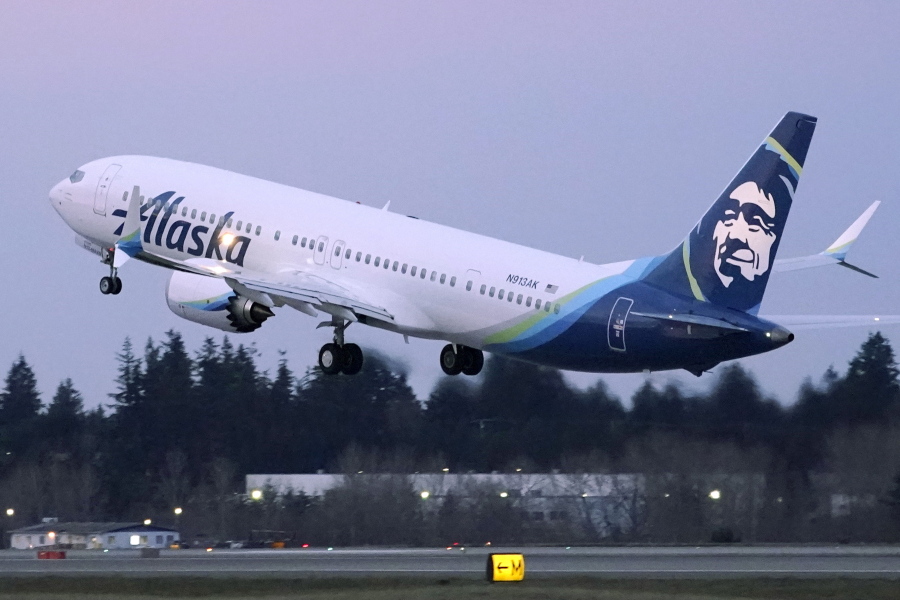Boeing delivered just four 737 MAXs in April before an electrical problem grounded the jet again, halting further deliveries until a fix is approved. The setback frustrated Boeing’s effort to begin to climb out of the pandemic downturn as air travel slowly recovers.
The company’s monthly update to its jet orders and deliveries figures, posted online Tuesday, otherwise showed marginal progress.
Deliveries of the 787 Dreamliner, which resumed in March after a more than four-month halt due to a separate production quality issue, picked up in April. And while last year was dominated by order cancellations, Boeing for the third straight month showed a small positive net order total.
However, as U.S. airlines look to a recovery in domestic travel, the 737 MAX is the Boeing jet in most demand, so the stoppage in deliveries is a major blow that drastically cuts much-needed cash flow.
Due to a change in the manufacturing process, various panels and power control units on the MAX flight deck built since early 2019 are not properly grounded electrically, which can potentially affect operation of certain systems, including engine ice protection.
The issue affects 109 airplanes that have been delivered to airlines — including Alaska, American, Southwest and United — as well as about 350 still awaiting delivery. Boeing has proposed a fix but none of those planes can fly until the Federal Aviation Administration approves it.
Although late last month Boeing CEO Dave Calhoun said on CNBC that he expected FAA approval in “relatively short order,” the safety agency demanded more engineering detail on the proposed modifications. Almost two weeks later, Boeing is still waiting.
Dreamliner deliveries pick up
Boeing delivered a total of 17 aircraft in April. That included 13 widebody jets: nine 787 Dreamliner passenger planes, two 777 freighters, one 767 freighter and one 767 KC-46 that will become an Air Force refueling tanker.
Boeing will have to sharply step up 787 deliveries to reduce the large backlog of about 100 parked planes due for rework that built up both in Everett and South Carolina during the delivery halt.
The company said it anticipates delivering “the majority of these airplanes” this year, in addition to those rolling off the production line at a rate of five jets per month.
On the sales side, Boeing won a net total of eight new orders last month, consisting of 22 new orders and 14 cancellations.
With the air cargo market the only healthy segment of the aviation world during the COVID-19 pandemic air travel downturn, the new orders included one for five 777 freighters from Silk Way West Airlines of Azerbaijan.
The April orders also included an order for 14 new 737 MAXs from lessor Dubai Aerospace Enterprise and three more MAXs for unidentified buyers.
In addition, L.A.-based aircraft lessor Air Lease Corp. renegotiated a contract for three MAXs, canceling its previous order and signing up on new terms.
So far in 2021, Boeing has delivered 94 jets and won 84 net new orders.
European rival Airbus delivered 45 aircraft in April, boosting total deliveries this year to 170 jets.
However, despite a new order from Delta for 25 of its fast-selling, long-range single-aisle jet, the A321neo, Airbus still has more cancellations than new orders in 2021. At the end of April, its net order tally stood at negative 35 jets.
The Airbus delivery advantage is largely due to its ability to deliver more of its single-aisle A320neo family of jets, the rival to Boeing’s 737 MAX.
Airbus delivered 37 single-aisle jets in April: 3 of the smaller Canadian-designed A220s, 3 classic A320s, 18 of the new A320neos and 13 A321neos. It also delivered 8 widebody jets: 6 large A350-900s and 2 mid-size A330neos.
The European jet maker also renegotiated the terms of an existing order for 22 jets in the A320neo family with aircraft lessor Avolon.
The A320neo jet family backlog now stands at 5,654 aircraft. The MAX backlog stands at 3,191 aircraft. That huge gap in single-aisle market share, which developed from the crisis after the two fatal MAX crashes, is what separates the two rivals.
Airbus plans to maintain pressure in that market. Bloomberg reports that it has told suppliers to be ready for a ramp-up in production of the A320 jet series from the current 40 per month to as many as 53 a month by the end of next year.
Airbus had earlier set out plans to raise production to 43 A320s per month in the third quarter and 45 by the end of the year.
The 53-jets-per-month target reflects the top end of a range under consideration and no final decision has been taken, according to people familiar with the planning, Bloomberg said.
Boeing CEO Calhoun said last month that 737 production should rise to 31 jets per month early next year, with further gradual increases in line with demand. He also said those increases will depend on the Chinese market opening up to Boeing.
The Airbus total backlog of unfilled orders for all jets is now 6,979 airplanes. Boeing’s corresponding backlog is 4,045 airplanes.



